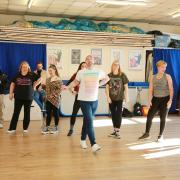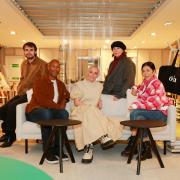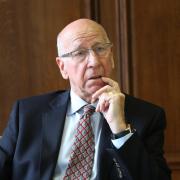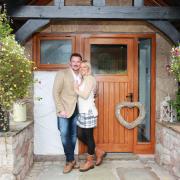Stockport’s outgoing Bishop Libby Lane, her mum, Helen, and daughter, Connie, talk about their close relationship.
If behind every powerful man is a woman then maybe behind every powerful woman is her mother. Certainly, the Church of England’s first ever female bishop Libby Lane agrees to owing her incredible achievement to her 80-year-old mother, Helen Holden.
To mark Mother’s Day on March 31st, we caught up with Helen, Bishop Libby and her daughter, Connie, at home in Dunham Massey - although it won’t be Bishop Libby’s home for much longer as she moves on from her role as Bishop of Stockport and will be installed as the Bishop of Derby after Easter.
Becoming the first ever female bishop in 2015 was a revolutionary path for the 52-year-old, who was brought up in Glossop. But she says the support she received from both parents was extraordinary.
‘I have an older sister and a younger brother and that’s what we understood from our mum and dad - that they would support us in whatever we wanted to do,’ she says.
‘There was nobody in the family who had ever been involved in the ministry before but when I was aware of doing it and it was something I was committed to and passionate about, I knew they’d support me fully.’
Another old adage ‘like mother like daughter’ comes to mind when Helen talks about her path to becoming a teacher. She might not have been on the road to a highly public position but the path she chose was still a challenging one.
‘I was born just before the outbreak of the Second World War and my dad was called up when I was a baby,’ she recalls.
‘I only remember seeing my dad twice before I was 10. I lived with my mum in my grandmother’s rented boarding house. I passed my 11 Plus, went to grammar school and did teacher training and then taught in a primary school and then became a head teacher.’
That sounds very straightforward, explains Libby but it was more problematic than that.
‘My mother had really wanted to go to university and had to settle for teacher training college because that was what was expected of her,’ she says.
‘So she didn’t go to university when she left school and when she was teaching and wanted to develop her own career was told, because she didn’t have a degree, that she couldn’t. Of course she didn’t listen and when I was a child my mother was teaching full time, looking after three children under 10, and doing a degree.
‘That example of mum’s commitment and perseverance and drive to do the best she could and use all her gifts and skills, was the model I grew up with.’
Luckily for Libby, cultural expectations for women has shifted but that wasn’t the case when she entered the church.
‘My mum’s generation and her parents’ generation had, I think, culturally different expectations of what women could do, specifically in the church,’ she says.
‘When I began my training to be ordained, the church didn’t even allow women to be vicars. That was 25 years ago and two decades later the legislation was passed about women bishops. And the church did that discussion very publically and so those of us women who were in the church during that period benefitted from a decade when women and men prayed and struggled to get the culture changed.’
Having two very strong women in her family has helped Libby’s daughter, 24-year-old Connie, to realise her own potential. This month she will be flying across the globe to work on mental health projects in South Korea.
‘I’m going to Sungkyunkwan University in Seoul,’ she reveals.
‘I want to work with mental health organisations in South Korea, as it has the highest suicide rate in the world. I feel very strongly pulled to work with people with mental health issues. I also want to learn about other people’s cultures to learn what suits them best for where they are because it isn’t a one size fits all type of thing.
‘The Anglican church is very involved in South Korea and I was very fortunate that my mum introduced me to the Archbishop of South Korea and they got me a job in the University so I can teach and learn about the culture. It’s almost a weird combination of my mum and grandmother’s work but also my own journey, as I suffer from depression.
‘I think I am really lucky because I have got my grandma and my mum passing on their skills and their stories. That helps me in my journey and the things I have had to struggle with. It means I appreciate all the education I wished to experience. I got to choose to have a gap year and then work for a bit do a masters course and then travel to the other side of the world. Things that women before me wouldn’t have dreamed of doing.’
As her career progresses Bishop Libby, who has been married to Anglican priest George for nearly 30 years, is very aware that what she has achieved couldn’t have happened without women like her mother and daughter, striving to make their own lives fulfilling and meaningful.
‘The place that I’ve held has been very public in a way that’s really important for people on the outside looking in. That a woman has been able to hold that space and hold that in the public gaze,’ she says.
‘Because it’s public many people are appreciative of the place I have held but I think that the courage my mum showed in persevering through the things she needed to do to fulfil her potential without any external support, and the courage Connie is showing in her own lived experience, are equally important.
‘I only get to do what I do because people like my mum and my daughter have the courage to change their own world.’



























